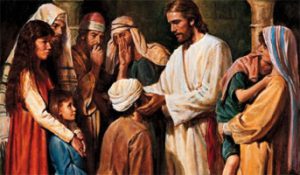 In this Gospel story we find clues that promote our understanding of the sacramental “laying on of hands” and the sacredness of human touch. We are struck by the physical means Jesus used to heal the man’s lack of hearing and speech: the use of spittle and touch – both discouraged in today’s post-COVID “stay safe” world. Jesus cannot explain to the deaf man verbally what He is about to do, so He uses a rough form of sign language to communicate His intentions. First, He sticks His fingers in the man’s ears to let him know that He is going to do something about his deafness. He spits on His finger and touches the man’s tongue to let him know that He is about to restore his speech. This might sound gross, but it’s what Jesus does! And, it awakens faith in this man’s heart.
In this Gospel story we find clues that promote our understanding of the sacramental “laying on of hands” and the sacredness of human touch. We are struck by the physical means Jesus used to heal the man’s lack of hearing and speech: the use of spittle and touch – both discouraged in today’s post-COVID “stay safe” world. Jesus cannot explain to the deaf man verbally what He is about to do, so He uses a rough form of sign language to communicate His intentions. First, He sticks His fingers in the man’s ears to let him know that He is going to do something about his deafness. He spits on His finger and touches the man’s tongue to let him know that He is about to restore his speech. This might sound gross, but it’s what Jesus does! And, it awakens faith in this man’s heart.
After touching the man, Jesus looks toward Heaven. This act serves two purposes. First, it communicates to the deaf man the origin of the healing. Secondly, the act of looking toward Heaven demonstrates Jesus’ dependence on his Father. As Jesus raises his eyes heavenward, he “sighs”. Of course, the deaf man cannot hear the sigh, but he can see Jesus’ expression. And, it speaks volumes, more than words could say: “I care about you and what you are going through!” Jesus says one word, “Ephphatha”- “be opened”. When Jesus says this, the man’s hearing is restored and his tongue is loosed. He can hear and speak! What a miracle! One command from Jesus and his life has changed forever! The witnesses declared: “He has done all things well!”
This week we are invited to make an honest inventory of our true needs. Have I found contentment? Am I close enough to God to receive guidance and strength? Have I secured peace of heart and mind? Deciding what we lack is the first step in securing it. Only then can we express our needs to Christ who has said: “Ask and you shall receive.” But, remember God-time may not match our unspoken expectation. When God takes time answering our prayers, it’s not because we’re not heard or that God doesn’t already know our needs. God is giving us the gift of time to recognize what our true needs are.
One of the greatest weaknesses of the human heart is the inability to tune into people’s underlying needs. One may indeed lack food for the table, but her real need may be for a fair wage for her 8-hr job. We can hear the cries of broken, suffering people in lands across the sea, but be oblivious to the cues of the persons that every day are sitting right beside us. Remember the expression: “Your actions speak so loud I cannot hear what you are saying.” (Ralph Waldo Emerson)
This man in the Gospel, though he was lacking hearing and speech, he had people around him that cared about him. They heard that Jesus was passing by, and they brought their friend to Jesus. Benedict calls to us to “carry each other”. We can help one another understand the word of God spoken in community decision-making and help one another accept decisions that are contrary to personal wishes. We are to uphold the weak, challenge the faint-hearted, rouse the sleepers, and open our eyes to the light that comes from God and our ears to the voice from heaven that every day calls out to us. This is how St. Benedict teaches that we shall “progress in the way of life and faith, running on the path of God’s commands, our hearts overflowing with the inexpressible delight of love.” With the help of community, he says: “We will run, and not grow weary”.
The closing words of our Gospel remind us that Jesus does all things well. “All” may only be a three-lettered word but it is a mighty big word! It covers a lot of territory. If one letter is missing – one person missing out in decision-making – all that God designs to be accomplished may not come to fruition. How can a two-legged stool keep balanced? Jesus does all things well. Come to Him and let Him teach you the truth! You’ll shake your head saying, “Well done! Well done! Very well done!”
~Reflection by Sister Roberta Bailey, OSB
Pray for peace in our times… and guidance during the upcoming voting season.






